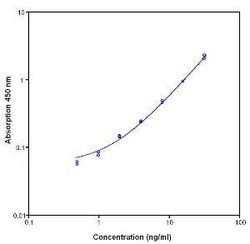Learn More
Invitrogen™ Human BCL-2 ELISA Kit

Description
Includes
Aluminium pouch(es) with a Microwell Plate coated with monoclonal antibody to human Bcl-2
Biotin-Conjugate anti-human Bcl-2 monoclonal antibody
Streptavidin-HRP
Human Bcl-2 Standard lyophilized, 64ng/mL upon reconstitution
Sample Diluent
Assay Buffer Concentrate 20x (PBS with 1% Tween 20 and 10% BSA)
Wash Buffer Concentrate 20x (PBS with 1% Tween 20)
Lysis Buffer 10x
Substrate Solution (tetramethyl-benzidine)
Stop Solution (1M Phosphoric acid)
Adhesive Films
The Human Bcl-2 ELISA quantitates Hu Bcl-2 in human serum, plasma, or cell lysates. The assay will exclusively recognize both natural and recombinant Hu Bcl-2. Principle of the method The Human Bcl-2 solid-phase sandwich ELISA (enzyme-linked immunosorbent assay) is designed to measure the amount of the target bound between a matched antibody pair. A target-specific antibody has been pre-coated in the wells of the supplied microplate. Samples, standards, or controls are then added into these wells and bind to the immobilized (capture) antibody. The sandwich is formed by the addition of the second (detector) antibody, a substrate solution is added that reacts with the enzyme-antibody-target complex to produce measurable signal. The intensity of this signal is directly proportional to the concentration of target present in the original specimen. Rigorous validation Each manufactured lot of this ELISA kit is quality tested for criteria such as sensitivity, specificity, precision, and lot-to-lot consistency. See manual for more information on validation.

Specifications
Specifications
| Accession Number | P10415 |
| Assay Range | 0.50 to 32.0 ng/mL |
| Assay Sensitivity | <0.5 ng/mL |
| Conjugate | HRP |
| Product Type | ELISA |
| Sample Type | Cell Lysates, Plasma, Serum |
| Target Species | Human |
| For Use With (Application) | ELISA |
| For Use With (Equipment) | Colorimetric Microplate Reader |
| Gene ID (Entrez) | 596 |
| Show More |
The Fisher Scientific Encompass Program offers items which are not part of our distribution portfolio. These products typically do not have pictures or detailed descriptions. However, we are committed to improving your shopping experience. Please use the form below to provide feedback related to the content on this product.
